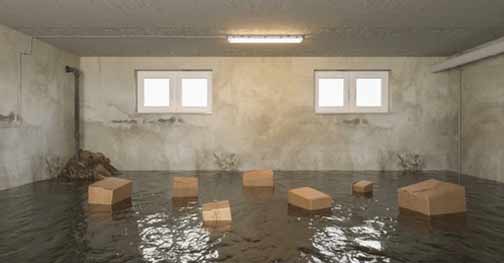
A flooded basement is every homeowner’s worst nightmare. Standing in your flooded home and surveying your scattered belongings floating or submerged in water, it is easy to let yourself descend into helplessness. But that is the last thing you need in this situation, says Stripe Management.
A flooded basement is a terrible problem, but you can decide how much damage this emergency does to your home. Time is of the essence when dealing with a flooded basement. Timely action is the make-or-break factor.
Ten minutes of strategic actions can be the difference between cutting thousands of dollars from your repair costs versus long-term health and financial consequences. What are the immediate steps to take when your basement is flooded with water? Find the answers below:
Shut off the power
Virtually all basements have electrical fixtures and power outlets. Even if you think the water level is not high enough to have come into contact with electricity, you should still shut off the power to the area or your entire home. If you are unsure how to do this, drop everything and call a qualified electrician and plumber. Of course, this will give the water more time to damage your home, but your safety and that of your family’s are paramount.
Protect yourself before anything else.
Even if you have shut off the electricity and regardless of the water source in your basement, wear boots and gloves (preferably rubber) for protection. If the water reaches higher than your knees and you have hip or chest waders in your home, put them on. Be careful not to slip when moving around the flooded basement.
Turn off the water
Determine the source of the water inside your basement. Common causes of basement flooding include leaky pipes, frozen and burst pipes, failed sump pumps, heavy rainfall, boiler or water heater problems, and an overwhelmed sewer line. If the problem is not due to an adverse weather event, you want to find your main water shut-off valve and close it. It will stop more water from entering your basement. If the flood is from heavy rain, wait until the rain stops before you assess your basement.
Call the insurance company
If you have flood insurance, now is the time to let the insurance company know what is happening in your home. The insurance company agent or broker will ask you questions to get details about the event. Note that you are not yet obligated to answer your insurer’s questions, especially given your state of mind. That is also the right time to call a professional plumber, preferably an emergency plumber who can handle a flooded basement.
Check the basement floor drain
Most basements have a flood drain; yours probably does. You want to ensure the floor drain is not blocked when the basement gets flooded. A functioning floor drain will help the water drain faster. The floor drain may be clogged with debris. Make it a habit to always check the basement floor drain after every flood event in your area.
Move damaged or wet items out
Items that can withstand water should be left in place. Move all items that are prone to water damage. If the items are wet, move them to a well-ventilated area of your home. If it is sunny outside, you may want to take the items outside. Items not thoroughly dried after 48 hours should probably be discarded to prevent mold and mildew. Do not discard any items until your insurance company has seen them.
Do not move electrical items
Any of your belongings that use electricity should be left in place, even if you have shut off the power supply to the area or your entire home. Unless you are a trained electrician, it is best to let televisions, lamps, and other electrical items dry in place. The most you should do is disconnect them. If the items are salvageable, an electrician will know how to dry them.
Document the damage
For your personal records and to facilitate your insurance claims process, document the damage to your home via videos and photos. Make sure you capture the source of the water and your damaged items. Adding narration while recording the scene helps to capture the emotion of the moment, and you can avoid the risk of forgetting important details later.
Lastly, what kind of plumber should you call when you have a flooded basement? You need an emergency plumber; these are professional plumbers specifically equipped to deal with emergencies. An emergency plumber can come to your aid 24 hours a day, 7 days a week.

